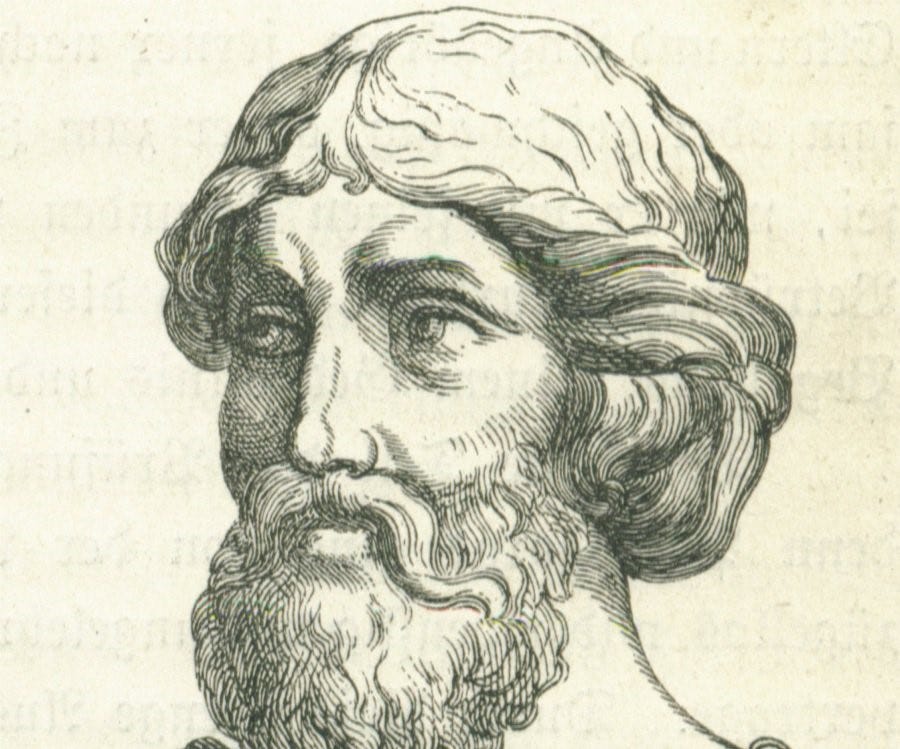Pythagoras: Crazier than a theory about triangles
Hey friends,
Thank you to everyone who joined in our discussion on Friday about aesthetics and beauty. If you missed it you can find the discussion here. I love that we are starting to create a community of people who can chat about topics that they really care about. It’s looking like a bright future.
If you have any friends that you think would love these emails then please forward it to them! It would mean the world and more people to take part in Friday discussions.
Enjoy this week’s thinker!
Pythagoras is an ancient Greek philosopher and mathematician who is best known nowadays for his eponymous theory about triangles. But as a thinker, Pythagoras is so much more than what we learn in maths.
In the ancient world, Pythagoras would have been known for the myths and legends that surrounded his life. They have managed influenced huge names such as Copernicus, Newton and Kepler. He is credited with many mathematical and scientific discoveries including Pythagorean theorem, the sphericity of the earth and Pythagorean tuning.
But it is difficult to verify these claims when they are mixed with legends about Pythagoras rising out of the underworld as a demi-God and possessing a gold limb that he showed off at the Olympics in Olympia. The difficulty in any discussion of Pythagoras is to separate the actual man and his teachings from the vast mythology that surrounded him.
To craft 3 ideas that might be relevant today, I have chosen the information about Pythagoras that is most plausible.
Education, influence and standing on the shoulders of giants
The earliest source on Pythagoras’s teachings is a poem written by Xenophanes who would have been one of his contemporaries. It seems that Pythagoras travelled extensively and learnt from the best in the ancient world.
It is said that he received an education and studied in Egypt, under the Jews, all around his homeland Greece, under Hindu sages in modern-day India and with the Iberians and Celts in modern-day Spain and Portugal. It is difficult to say which of these are true and which are trying to jump on the Pythagoras bandwagon but it is clear that he learnt from the best he could find.
The latest wisdom from across the ancient world allowed him to create theories that influenced so many. Copernicus came in contact with scientists and philosophers rediscovering the importance of Pythagoras. Johannes Kepler converted to Copernicus’s world system partly because he was convinced by Pythagorean theories of harmony and mathematics.
This is a perfect story of how knowledge is passed through time. Pythagoras learnt from where he could and then others were able to take from his works. We need to learn from great thinkers of the past if we want to change the world.
Not caring what others think
Pythagoras did things differently. He thought that both women and men should be taught philosophy. Female members of Pythagoras's school appear to have played in its operations and contributed to its success. This was unusual and went against the rest of his society in which males dominated.
It is no doubt that Pythagoras would have been criticised for this decision but he didn’t care what others thought.
Pythagoras lived in a commune with a band of cult-like followers. They studied philosophy, religion and maths together, ate meals together and shared all of their possessions. New initiates weren’t allowed to even meet Pythagoras for 5 years - it was a pretty select group!
Pythagoras decided to just live in a commune because he wanted to. He didn’t care what others thought about what he did. He just did it.
Take inspiration and influence from anywhere
Pythagoras hit upon the insight of creating a lyre with strings at different tensions while walking past a blacksmith and hearing the hammer beating against the metal and ringing out at different tones. He was just walking along like he would any day.
What made this day different is that he was open to influence and took inspiration from absolutely anywhere.
He returned home and practised stretching strings on different weights which have different tensions and different musical ratios like octaves. Pythagoras was very interested in the overlap and relationship between maths and music. Some say that he even invented many of the instruments that dominate music today.
But others disagree and argue that’s all myth…
We now return to the main issue with the study of Pythagoras. That his life is so shrouded in myth and legend that it is difficult to work out what is true and what is false.
But we should also ask: Does it even matter?
This newsletter is about the lessons we can learn from the greatest thinkers and how they can be relevant and helpful in our lives. Historical accuracy is less important when we look at history as a collection of ideas.
If we look at Pythagoras as a collection of ideas then we get the most out of him as a thinker. They can not only be interesting but also helpful in and relevant to our lives.
Referenced in this piece: Xenophanes: How To Be More Honest About Life
Bonus thinker for this week: Kepler: Stand Up For What You Believe
Thanks for reading, it means a lot. It takes a while to research and write these newsletters so please make sure two people you like see it. Make sure they benefit from my research too!
Take care, stay safe.
Jack.


